Acls rhythms updated - Study guides, Class notes & Summaries
Looking for the best study guides, study notes and summaries about Acls rhythms updated? On this page you'll find 15 study documents about Acls rhythms updated.
All 15 results
Sort by
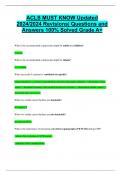
-
ACLS MUST KNOW Updated 2024/2024 Revisions| Questions and Answers 100% Solved Grade A+
- Exam (elaborations) • 20 pages • 2024
- Available in package deal
-
- $15.99
- + learn more
ACLS MUST KNOW Updated 2024/2024 Revisions| Questions and Answers 100% Solved Grade A+ What is the recommended compression depth for adults and children? 2 inches What is the recommended compression depth for infants? 1 1/2 inches What can result if a patient is ventilated too quickly? hyperventilation -> excessive intrathoracic pressure and gastric inflation -> decreased venous return -> decreased coronary and cerebral perfusion pressures -> diminished cardiac output -&...
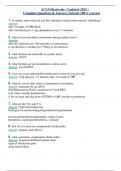
-
ACLS Heartcode ( Updated 2024 ) Complete Questions & Answers (Solved) 100% Correct
- Exam (elaborations) • 16 pages • 2024
- Available in package deal
-
- $11.99
- + learn more
ACLS Heartcode ( Updated 2024 ) Complete Questions & Answers (Solved) 100% Correct 1. in cardiac arrest when do you first introduce medical intervention? whichdrug? Answer: after 2 rounds of CPR/shock after 2nd shock give 1 mg epinephrine every 3-5 minutes 2. when do you introduce amiodarone during cardiac arrest? Answer: after the 3rdshock give 300 mg bolus of amiodarone if second dose is needed give 150mg as second dose 3. what rhythms are shockable in cardiac arrest Answer: VFVT ...
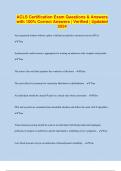
-
ACLS Certification Exam Questions & Answers with 100% Correct Answers | Verified | Updated 2024
- Exam (elaborations) • 22 pages • 2024
-
- $10.98
- + learn more
ACLS Certification Exam Questions & Answers with 100% Correct Answers | Verified | Updated 2024 Any organized rhythm without a pulse is defined as pulseless electrical activity (PEA). - True Synchronized cardioversion is appropriate for treating an unknown wide complex tachycardia. - True The aorta is the wall that separates the ventricles of the heart. - False The most effective treatment for ventricular fibrillation is defibrillation. - True An individual should be cleared-Ñ prior to...
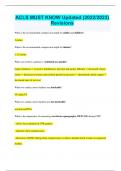
-
ACLS MUST KNOW Updated (2022/2023) Revisions
- Exam (elaborations) • 20 pages • 2024
-
- $12.49
- + learn more
ACLS MUST KNOW Updated (2022/2023) Revisions What is the recommended compression depth for adults and children? 2 inches What is the recommended compression depth for infants? 1 1/2 inches What can result if a patient is ventilated too quickly? hyperventilation -> excessive intrathoracic pressure and gastric inflation -> decreased venous return -> decreased coronary and cerebral perfusion pressures -> diminished cardiac output -> decreased rates of survival What two card...
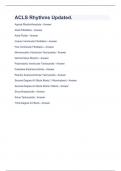
-
ACLS Rhythms Updated.
- Exam (elaborations) • 1 pages • 2024
- Available in package deal
-
- $8.49
- + learn more
ACLS Rhythms Updated.Agonal Rhythm/Asystole - Answer Atrial Fibrillation - Answer Atrial Flutter - Answer Coarse Ventricular Fibrillation - Answer Fine Ventricular Fibrillation - Answer Monomorphic Ventricular Tachycardia - Answer Normal Sinus Rhythm - Answer Polymorphic Ventricular Tachycardia - Answer Pulseless Electrical Activity - Answer Reentry Supraventricular Tachycardia - Answer Second-Degree AV Block Moritz 1 Wenchebach - Answer Second-Degree AV Block Mo...
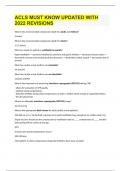
-
ACLS MUST KNOW UPDATED WITH 2022 REVISIONS
- Exam (elaborations) • 12 pages • 2024
- Available in package deal
-
- $13.49
- + learn more
ACLS MUST KNOW UPDATED WITH 2022 REVISIONS What is the recommended compression depth for adults and children? 2 inches What is the recommended compression depth for infants? 1 1/2 inches What can result if a patient is ventilated too quickly? hyperventilation -> excessive intrathoracic pressure and gastric inflation -> decreased venous return -> decreased coronary and cerebral perfusion pressures -> diminished cardiac output -> decreased rates of survival What two cardiac...
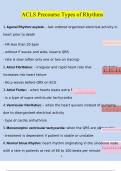
-
ACLS Pre-course Types of Rhythms | Questions with 100% Correct Answers | Verified | Updated 2024
- Exam (elaborations) • 4 pages • 2024
- Available in package deal
-
- $12.49
- + learn more
ACLS Pre-course Types of Rhythms | Questions with 100% Correct Answers | Verified | Updated 2024
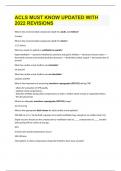
-
ACLS MUST KNOW UPDATED WITH 2022 REVISIONS
- Exam (elaborations) • 12 pages • 2024
- Available in package deal
-
- $13.49
- + learn more
ACLS MUST KNOW UPDATED WITH 2022 REVISIONS What is the recommended compression depth for adults and children? 2 inches What is the recommended compression depth for infants? 1 1/2 inches What can result if a patient is ventilated too quickly? hyperventilation -> excessive intrathoracic pressure and gastric inflation -> decreased venous return -> decreased coronary and cerebral perfusion pressures -> diminished cardiac output -> decreased rates of survival What two cardiac...
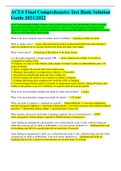
-
ACLS Final Comprehensive Test Bank Solution Guide updated 2023/2024, A+ Solutions
- Exam (elaborations) • 42 pages • 2022
-
- $16.74
- 3x sold
- + learn more
ACLS Final Comprehensive Test Bank Solution Guide updated 2023/2024, A+ Solutions-BLS & Chocking Relief of Adults, Children, Infants; Opioid Overdose; EKG interpretation; Cardiac anatomy; Team dynamics; BLS/Primary/Secondary Assessment; H's & T's; Airway Management; Bradycardia ACLS Algorithm; ACS ACLS Algorithm; Stroke ACLS Algorithm; Tachycardia ACLS Algorithm; Immediate Post-Cardiac Arrest Care ACLS Algorithm; Phamacology What is the most common cause of cardiac arrest in children? - respi...
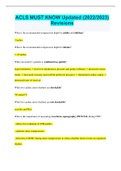
-
ACLS MUST KNOW Updated (2022/2023) Revisions
- Exam (elaborations) • 20 pages • 2023
- Available in package deal
-
- $9.99
- + learn more
ACLS MUST KNOW Updated (2022/2023) Revisions What is the recommended compression depth for adults and children? 2 inches What is the recommended compression depth for infants? 1 1/2 inches What can result if a patient is ventilated too quickly? hyperventilation -> excessive intrathoracic pressure and gastric inflation -> decreased venous return -> decreased coronary and cerebral perfusion pressures -> diminished cardiac output -> decreased rates of survival What two cardiac ar...

Study stress? For sellers on Stuvia, these are actually golden times. KA-CHING! Earn from your study resources too and start uploading now. Discover all about earning on Stuvia


